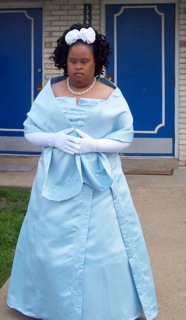
According to MedicineNet.com, Down Syndrome is a result of having an extra copy of chromosome 21 in every cell. The National Down Syndrome Society (NDSS) states that mental retardation is related to Down Syndrome because the genetic disorder causes cognitive delays, which vary from person to person. Many people with Down Syndrome also have medical problems, like congenital heart defects and endocrine, skin, vision, and respiratory problems, just to name a few. In addition to the common symptoms related to Down Syndrome, my sister is diabetic and has a slight case of strabismus (crossed eyes).
March of Dimes states that Down syndrome affects about 1 in 800—about 3,400 babies a year in the U.S. According to NDSS, there are more than 400,000 people with the disability in the U.S.
The National Institute of Child Health and Human Development states that the chances of having a Down Syndrome baby increases for pregnant women over 35. Many health care providers recommend that women over the age 35 have a prenatal test that detects Down Syndrome.
A lot of people have a misconception that people with Down Syndrome are stupid, weird, and have no capability to function. But the actual fact is that they have the capability to function; it just might take them a little longer to increase in a technique (retardation), according to MedTV.com. They are allowed to go to school, just as every other child. Federal law protects the right of every child when it comes to education.
Dr. Earlene Brownridge, my sister’s pediatrician, who works at Brownridge Pediatric in Hazelwood, MO, tells SciJourner that people with Down Syndrome talk and giggle amongst themselves as a sign of coping—dealing with responsibilities, problems, and different situations.
What is my sister thinking? Does she think about having a boyfriend? Does she ever feel pressured? Is she alone? Why does she talk to herself? I asked Desheena these questions because they are typical teenager concerns.She never answers the question about feeling alone, but I think that my entire family is so exciting—there’s never a dull moment—that she’s never alone. We always find time to sit and talk with her.
When it comes to boys, my sister loves them; just like a typical 18-year-old girl. She told me one day, “I’m going to get married to a husband, and be happy.” I only hope and pray that this statement will come true and that she’ll find someone who genuinely does care for her.
Everyone experiences pressures in life; you just have to learn how to overcome it. Desheena has overcome so many obstacles in the form of sickness and also being pressured.
During the 1900’s, having a child with the diagnosis of Down Syndrome was like a death sentence. Kids with Down Syndrome would die before their tenth birthday. This began to change in 1983 as the expected lifetime rose to 25 years. By 2010 it had increased dramatically to 60 years of age, according to the World Health Organization.
I work with other Down Syndrome people at Northern Star Adult Daycare in Florissant, MO. They are similar to Desheena, and I find myself worrying about her in the future—hoping that no one will ever take advantage of her.
To me Desheena’s answers prove that teenage with Down Syndrome have similar thoughts and feelings just like average teenagers. And even though the life of a Down Syndrome person is hard, they can make it through this world just like me and YOU! Sakoya Kiuntaye Boyd

This work is licensed under a Creative Commons Attribution-NonCommercial-NoDerivs 3.0 Unported License
















Im so proud of myself!!!! Thank You Desheena for being my INSPIRATION. :smile
I think this article is amazing and it was based on a personal level. I think that Sokya has a bright future in the writers world.
Thank You!!!!
I am so proud of you for writing an article like this to show everyone that disabilities won’t stop people from living. And I love the format of the article and how there was clear research and i can see the love that you have for you sister. Because I know that there are many people that are going through the same thing and it’s good that this is shown in a positive light.
Thank You to all who left comment on my article!!!!!!
Thank You so much
WOW! This is wonderful! You did a fantastic job writing this article…and I truly mean that. I can see where you did your research to back up what you were saying. Good work. God has blessed you with a great talent and Desheena is also blessed to have you as a sister.
God bless you,
Rev. barb~
The fact that this article was written by another teenager like myself makes it even more incredible. I hope that Desheena really does get married in the future! 🙂
I think that everyone should be happy….AND THEY SHOULD BE….NO MATTER WHAT!!!!
I love this. i love kids with downsyndrome. i used to baby sit a kid that had it and he changed my life. :smile
Gives me hope!!!